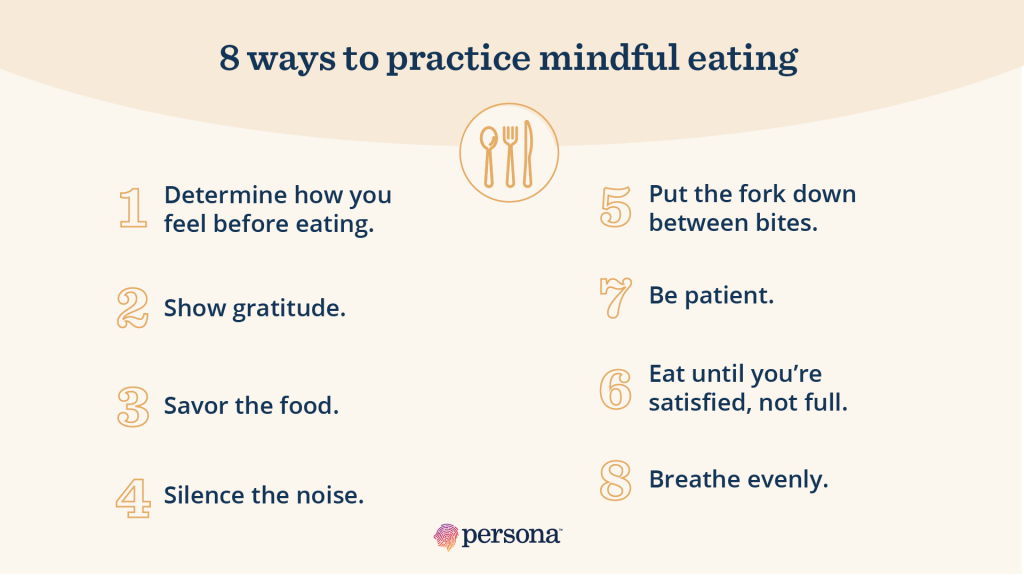Remember when your mom said, “Slow down and chew your food”? Turns out she was right (as usual). Whether your mom knew it or not, she was describing a form of mindful eating. That means, in essence, eating with intention, with full physical and emotional awareness and without judgment. It’s a way of eating rooted in Buddhist practice from 2,500 years ago—and it still delivers advantages today.
Let’s dive into 5 of its benefits.
1. Rediscover satiety
Although a lot of recent interest in mindful eating is about weight loss, the real value is in helping you pay closer attention to hunger and satiety. Let’s face it, when life gets chaotic, slowing down to eat thoughtfully is just not on the radar. We eat while we work, we eat while we scroll through TikTok, we eat while we get caught up on the news. Because of that, it’s easy to miss the important cues that tell you when you’ve had enough–which can lead to overeating.
If you’re gobbling a Buddha Bowl, your brain can’t keep up with your gut. Satiety—aka your feeling of fullness after eating—can take 15 minutes or more to set in. As your stomach stretches, special nerves called vagal nerves send satiety signals to your brain. And as your body digests the food and releases certain nutrients, gastrointestinal (GI) hormones send more signals to the brain that you’re full.1 Mindful eating slows you down, allowing you to feel nourished and satisfied at the right time.
2. Less digestive issues
If you’re experiencing digestive issues, mindful eating may help – the very act of chewing more thoroughly means more digestive enzymes are released to help break down food, making it easier on your gut. And you’re also less likely to swallow air, which can cause uncomfortable bloating.
Not just that, but it can help with functional gastrointestinal disorders (FGID) —a group of conditions related to stress that disrupts the brain-gut interaction – and affects as many as 40% of people globally. A Doctor of Clinical Nutrition – Christine Cherpak DCN, CNS, CDN shares a theory called the Stress-Digestion-Mindfulness Triad that after an acute stress is over, your body should return to its normal steady state called homeostasis. But sadly, that’s not the case. When you experience chronic stress, it impairs homeostasis and contributes to gastrointestinal disorders and other chronic diseases. 2,3
That’s where mindful eating comes in. Simply put, when you practice mindfulness, and by extension mindful eating, it may improve FGID such as irritable bowel syndrome and dyspepsia.
3. Better relationship with food
If you’ve ever struggled with feeling guilty after eating pie, you’re not alone. It’s a common issue, and one that’s important to address, as those negative feelings can contribute to an unhealthy relationship with food.
Mindful eating can be a useful tool for overcoming these issues: It’s all about being non-judgmental. What does that mean? Think about this example. If you felt guilty about a slice of Dutch apple pie, you may start associating pie with feelings of remorse. Mindful eating invites you to experience a new slice with fresh eyes not linked with any past feelings.
But before diving in, consider this mindful technique, “Do I even want this pie?” The idea is not to be restrictive, but aware. It means that you don’t mindlessly devour the pie but savor each bite. You might even surprise yourself and find you only eat half, when you’d normally eat the whole thing.
Research shows mindful eating may even help with binge eating and emotional eating.4 Better control of eating habits can increase self-trust and body satisfaction.
4. More fun eating
We all want to have fun—and for good reason. Doing pleasurable activities releases feel-good hormones like dopamine that help to manage stress and promote reinforcement. When you’re not having fun, healthy eating can feel like a chore.
Mindfulness can bring back those feel-good sensations by encouraging you to savor every bite. Interesting things happen when you allow the flavors of food to develop as you go. You’ll taste nuances that might have been gulped over, explore the texture and sometimes find gratitude for where it came from. By combining mindful eating with healthy food choices, you’re setting yourself up for long-term success.
5. Increased well-being.
In this modern-day cycle of stress and resulting illness, mindfulness is key to staying healthy, especially when you extend it into areas beyond eating. Could you be more mindful when dealing with a frustrating situation? Is it possible to breathe into the tension and find a moment of calm?
With greater mindfulness, it’s possible to improve your wellbeing in many respects: self-esteem, mental clarity, heart function, sleep and emotional intelligence.

Last words
This list is just the start. Here are a few other ways to practice mindful eating:
- Determine how you feel before eating. Mindful eating begins before you even pick up your fork.
- Silence the noise. Turn the TV off, mute your cellphone and put down the paper. Allow yourself to be present with your food. Distractions can dampen important brain-gut signals.
- Put the fork down between bites. This ties into the next point of savoring the food. You’re less likely to focus on the food in your mouth when you already have the next bite waiting.
- Savor the food. Engage all the senses. Chew slowly and thoroughly. Allow the food to completely liquify before swallowing.
- Breathe evenly. This allows the food’s aroma to develop better.
- Eat until you’re satisfied, not full. A helpful practice is to eat until you’re 80% full.
- Show gratitude. Think about the food in front of you. What went into the cultivation? Thank the person who prepared it for you.
- Be patient. It may take time to get the hang of mindful eating. Or you may not be able to do it with every meal. But there is likely at least one meal in the day that you can slow down and savor. That’s a good place to start.
These techniques aren’t the only way to eat healthy; mindfulness can complement other healthy eating habits like The Mediterranean Diet or using portion control.
If you’re interested, but have no idea where to start, a clinician may be able to help by administering the Mindful Eating Questionnaire (MEQ) developed by Framson and colleagues.5
For more healthy tips, check out: A guide to good gut health from a nutritionist
About Ruby
Ruby is a Registered Pharmacist, Board Certified-medication Management Specialist, and Personal Chef. She believes that whole health creates more vibrant living and is a strong advocate for integrative wellness.
Do you have questions about supplements? Reach out to one of our experts, or take Persona’s free nutrition assessment, and learn exactly what you need to take your wellness to the next level.
*These statements have not been evaluated by the Food and Drug Administration. This product is not intended to diagnose, treat, cure, or prevent any disease.
This information is not intended as a substitute for the advice provided by your physician or other healthcare professional, or any information contained on or in any product label or packaging. Do not use the information from this article for diagnosing or treating a health problem or disease, or prescribing medication or other treatment. Always speak with your physician or other healthcare professional before taking any medication or nutritional, herbal, or homeopathic supplement, or using any treatment for a health problem. If you have or suspect that you have a medical problem, contact your health care provider promptly. Do not disregard professional medical advice or delay in seeking professional advice because of something you have read in this article.

